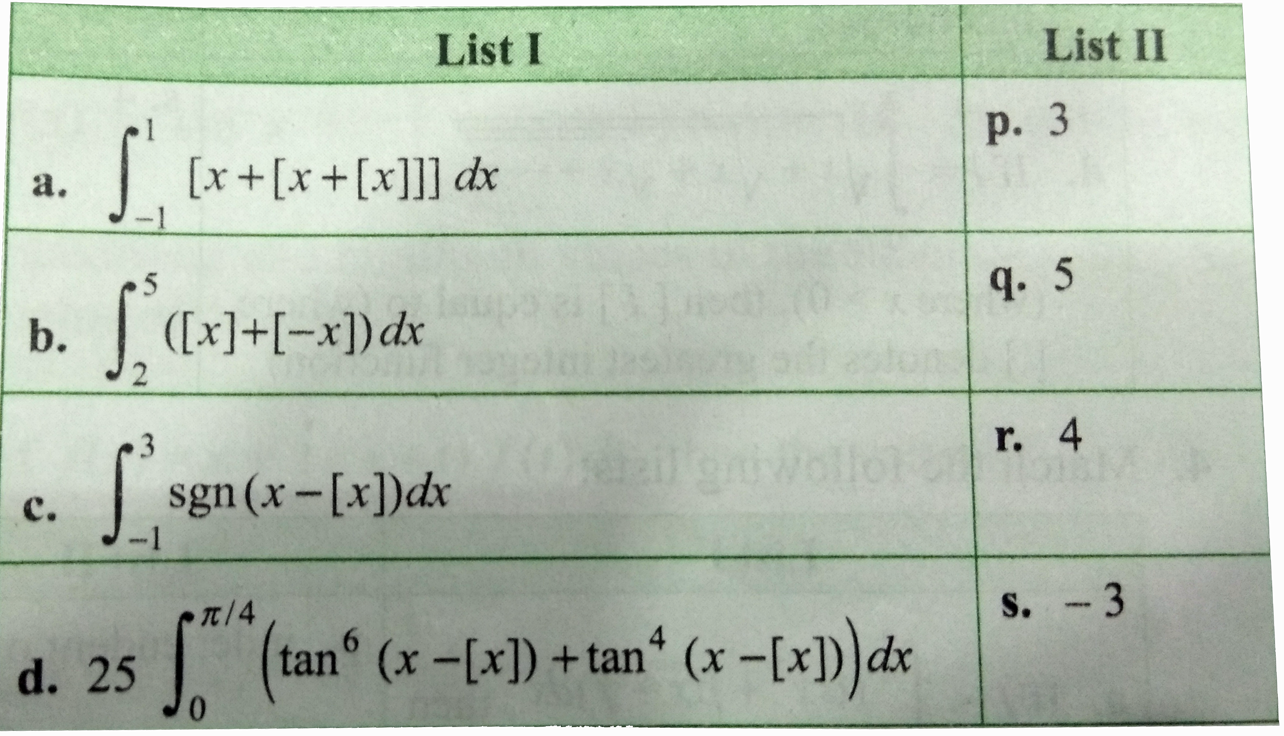Let f(x) and ϕ(x) are two continuous function on R satisfying ϕ(x)=∫xaf(t)dt,a≠0 and another continuous function g(x) satisfying g(x+α)+g(x)=0∀xεR,α>0, and ∫2kbg(t)dt is independent of b
Least positive value fo c if c,k,b are n A.P. is Solution in Bengali
0
1
α
2α
The correct Answer is:D
g(x+α)+g(x)=0
or g(x+2α)+g(x+α)=0
or g(x+2α)=g(x)
Thus g(x) is periodic with period 2α.
∴∫2kbg(t)dt=∫b+cbg(x)dx ( ∵b,k,c in A.P.)
This is independent of b. Then c has least value 2α.
Topper's Solved these Questions
- BOOK - CENGAGE PUBLICATIONCHAPTER - DEFINITE INTEGRATION EXERCISE - MATRIX MATCH_TYPE6videos
DEFINITE INTEGRATION
- BOOK - CENGAGE PUBLICATIONCHAPTER - DEFINITE INTEGRATION EXERCISE - NUMERICAL VALUE_TYPE28videos
DEFINITE INTEGRATION
- BOOK - CENGAGE PUBLICATIONCHAPTER - DEFINITE INTEGRATION EXERCISE - MCQ_TYPE27videos
DEFINITE INTEGRATION
- BOOK - CENGAGE PUBLICATIONCHAPTER - CURVE TRACINGEXERCISE - EXERCISES24videos
CURVE TRACING
- BOOK - CENGAGE PUBLICATIONCHAPTER - DETERMINANTEXERCISE - Multiple Correct Answer5videos
DETERMINANT
Similar Questions
If [.] denotes the greatest integer function, then match the following lists:
 05:52View Solution
05:52View SolutionIf the value of (lim)n→∞(n−32).∑6nj=1√j is equal to √N then the value of N8 is __________
03:44View SolutionIf f(x) is integrable over [1,2], then ∫21f(x)dx is equal to
(a) (lim)n→∞1nn∑r=1f(rn) (b) (lim)n→∞1n2n∑r=n+1f(rn) (c) (lim)n→∞1nn∑r=1f(r+nn) (d) (lim)n→∞1n2n∑r=1f(rn)03:48View SolutionFind the derivative of y=sin2x−cosx
04:39View SolutionIf x∈R,ai,bi,ci∈R for i=1,2,3 and ∣∣ ∣∣a1+b1xa1x+b1c1a2+b2xa2x+b2c2a3+b3xa3x+b3c3∣∣ ∣∣=0, then which of the following may be true ?
03:46View SolutionLet f be a continuous function on [a,b]. If F(x)=(∫xaf(t)dt−∫bxf(t)dt)(2x−(a+b)), then prove that there exist some c∈(a,b) such that ∫caf(t)dt−∫bcf(t)dt=f(c)(a+b−2c).
View SolutionLet f(x) be a derivable function satisfying f(x)=∫x0etsin(x−t)dtandg(x)=fx−f(x) Then the possible integers in the range of g(x) is_______
03:24View SolutionLet f(x) and ϕ(x) are two continuous function on R satisfying ϕ(x)=∫xaf(t)dt,a≠0 and another continuous function g(x) satisfying g(x+α)+g(x)=0∀xεR,α>0, and ∫2kbg(t)dt is independent of b
If f(x) is an odd function, then01:32View SolutionLet f(x) and ϕ(x) are two continuous function on R satisfying ϕ(x)=∫xaf(t)dt,a≠0 and another continuous function g(x) satisfying g(x+α)+g(x)=0∀xεR,α>0, and ∫2kbg(t)dt is independent of b
If f(x) is an even function, then02:38View SolutionLet f(x) and ϕ(x) are two continuous function on R satisfying ϕ(x)=∫xaf(t)dt,a≠0 and another continuous function g(x) satisfying g(x+α)+g(x)=0∀xεR,α>0, and ∫2kbg(t)dt is independent of b
Least positive value fo c if c,k,b are n A.P. is03:49View SolutionLet f(x) and ϕ(x) are two continuous function on R satisfying ϕ(x)=∫xaf(t)dt,a≠0 and another continuous function g(x) satisfying g(x+α)+g(x)=0∀xεR,α>0, and ∫2kbg(t)dt is independent of b
If m,n are even integers and p,qεR, then ∫q+nαp+nαg(t)dt is equal to01:45View SolutionLet f:[a,b]→[1,∞) be a continuous function and let g:R→R be defined as
g(x)=⎧⎪ ⎪⎨⎪ ⎪⎩0ifx<a∫xaf(t)dtifa≤x≤b∫baf(t)dtifx>b Then03:58View SolutionIf f(t) is a continuous function defined on [a,b] such that f(t) is an odd function, then the function ϕ(x)=∫xaf(t)dt
03:32View SolutionLet f(x) and ϕ(x) are two continuous function on R satisfying ϕ(x)=∫xaf(t)dt,a≠0 and another continuous function g(x) satisfying g(x+α)+g(x)=0∀xεR,α>0, and ∫2kbg(t)dt is independent of b
If f(x) is an odd function, then05:35View SolutionLet f(x) and ϕ(x) are two continuous function on R satisfying ϕ(x)=∫xaf(t)dt,a≠0 and another continuous function g(x) satisfying g(x+α)+g(x)=0∀xεR,α>0, and ∫2kbg(t)dt is independent of b
If f(x) is an even function, then03:09View SolutionLet f(x) and ϕ(x) are two continuous function on R satisfying ϕ(x)=∫xaf(t)dt,a≠0 and another continuous function g(x) satisfying g(x+α)+g(x)=0∀xεR,α>0, and ∫2kbg(t)dt is independent of b
Least positive value fo c if c,k,b are n A.P. is05:35View Solution

